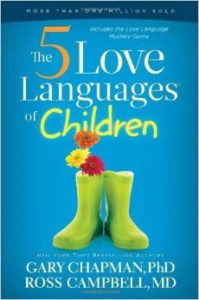In our recent blog post we discussed The 5 Love Languages of Children, by Chapman & Campbell and learned the benefits of using a child’s primary Love Language because it can provide a direct way to connect with them. The 5 Love Languages of Children asserts that once parents start speaking in a language which the child understands fluently, communication improves dramatically. The child’s Love Language provides a fast lane to their attention and their hearts. To recap, the five Love Languages are: Words of Affirmation, Quality Time, Physical Touch, Receiving Gifts, Acts of Services
This week we wanted to recognize the flip side of communicating via this direct link to her heart. Chapman and Campbell remind us to never use the primary love language to discipline or punish. Disciplining a child using her preferred Love Language, can be devastating. The message is received, amplified and taken to heart. If the discipline is delivered in anger, it crushes rather than corrects. The message keys directly into the lock that guards their most vulnerable part, sweeps over their defensive walls and strikes.
Think of it this way. Communicating via a Love Language opens and activates their deepest vulnerabilities. Instead of strengthening a connection and creating a positive experience, it delivers a sucker punch. This damages the relationship–especially when done in the heat of anger and frustration. This result is counter to our intentions as adoption-attuned parents who are committed to relationship building.
Chapman and Campbell devote an entire chapter of The 5 Love Languages of Children to the topic of anger. This may seem an odd concept to discuss in relation to Love Languages. Yet we all know that anger often accompanies parental efforts to discipline (and the child’s response to it). It is easy to lose sight of the education and training purpose of discipline and instead to concentrate on the punishment part. This serves neither child, parent nor the relationship. In fact, it damages both and it teaches a child to build higher walls to ensure protection from similar encounters in the future. Instead of learning from parents, they learn to fear connection with parents. Instead of heeding the parental message, the child tunes it out–and they miss the chance to acquire the missing skill that precipitated the need for discipline in the first place.
As adoptive families, we have a deeply vested interest in raising children with a strong emotional literacy. Adoption is inherently colored with complex feelings. It is up to us to educate our kids on how to express and cope with this crazy quilt of emotions. We must teach them that all of their emotions are welcome. In the absence of clearly conveying this openness, kids are left to struggle unsupported as they wrestle with the feelings of grief, loss, curiosity, joy and anger that is part of life in an adoptive family.
Chapman and Campbell further suggest that parents resist the urge to stifle children’s anger–especially verbal anger. It is after all, far better to use angry words than fists or other kinds of violence. Anger is a real and valid emotion and children need to be trained on how to express it productively, safely and with respect. Like all important learnings, this takes time and practice, (and good parental modeling.) For further exploration, read the entire book. It is chock full of strategies for parenting with compassion, respect and healthy relationship in mind.
Adults have primary Love Languages as well. Consider how these communication lessons can benefit our relationships with our spouse or partner. Commit to learning the Love Languages of your family members. (And to use them wisely.) Many benefits result when “love tanks” are full. Happy parents are the hub of happy families!





Imagine how difficult it would be for a child who’s love language is quality time to be put in time out. Our children are communicating through their behavior and want us to respond in a way that tells them they are loved and safe. #adoptiveparenting
#adoptiveparenting
#adoption
Yes, I agree with you that if you are disciplining your child with denying his or her Love Language, that is not good. If you want to test this statement, just think of how you would feel if say your Love Language was words of affirmation and you get “the silent treatment.” That surely doesn’t work for me! So not only would we want to know our child’s Love Language to connect with them but to avoid disconnecting as well. There is a lot of pressure in this world for our children to behave and a lot of pressure on parents to render discipline that works. But without the connection, the underpinnings of safety and security, discipline will fail.